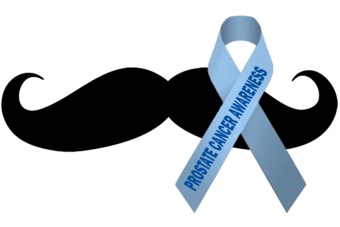Prostate Cancer

“Honey, I have cancer.” That was the start of a phone conversation I had with my dad a little over 10 years ago. He had just been diagnosed with progressive prostate cancer. I was devastated, but he was surprisingly calm, well educated, and very sure that all would be ok. Thankfully, all was ok, and I truly believe it was because he was extremely educated about this type of cancer. It ran in his family and he was having his PSA’s checked regularly. I feel very strongly about spreading the word about prostate cancer, and it happens to be Dr. John’s topic tomorrow morning on The St. Christopher Minute on the Tim Ridley Show at 6:30 am EST on Sirius Channel 146. Please tune in and ask questions!! Here are some stats and some facts…
Other than skin cancer, prostate cancer is the most common cancer in American men. According to the American Cancer Society, in 2017 there will be about 161,360 new cases of prostate cancer. There will be approximately 26,730 deaths from prostate cancer. About 1 man in 7 will be diagnosed with prostate cancer during his lifetime. The average age at the time of diagnosis is 66. The good news is this – Prostate cancer can be a serious disease, but most men diagnosed with it do not die from it. In fact, more than 2.9 million men in the United States who have been diagnosed with prostate cancer at some point are still alive today.
Only men have a prostate. It is a walnut-sized gland located directly under the bladder in front of the rectum. It produces seminal fluid that helps make up the semen. It surrounds the urethra, the tube that carries urine and semen out of the body. The prostate gland can also affect urine control.
Now, this is the important stuff. In the early stages of prostate cancer, there are typically no signs or symptoms. Because of this, the American Cancer Society recommends routine screenings, which includes a PSA (prostate specific androgen) test and a DRE (digital rectal exam). This is so important because if this type of cancer is caught in it’s early stages, survival rate is nearly 100%. In later stages, symptoms may include, burning or pain during urination, difficulty urinating, more frequent urges to urinate at night, loss of bladder control, decreased flow of velocity of urine stream and blood in the urine. If the cancer has metastasized a person may have difficulty getting an erection, swelling in legs or pelvic area, numbness or pain in the hips, legs or feet, or bone pain that doesn’t go away, or leads to fractures.
It is recommended that you start getting screened for prostate cancer at the age of 50 UNLESS you have one or more of the risk factors. Make sure your doctor is aware of any risk factors you may have. The risk factors to be aware of are 1) age- once a man hits 50 his chances of having prostate cancer dramatically increases. 2) race- Prostate cancers occur more often in African-American men. 3) Geography- it is more common in North America, northwestern Europe, Australia and Caribbean. 4) family history- having a brother or father with prostate cancer more than your risk of getting the disease. Diet, obesity and smoking may also play a role in developing prostate cancer.
If you have been diagnosed, there are many different treatment options, depending on the stage of cancer. Dr. John will discuss this in further detail tomorrow morning, but it varies from radiation therapy to radical prostatectomy. Hormone therapy and removal of lymph nodes may be needed in some cases.
Again, as I said earlier, it is SO, SO, SO important to know the risk factors and get checked regularly, because stage I and II has a survival rate of nearly 100%. State III and IV if it has not spread to distant parts of the body is also nearly 100% survival rate. Stage IV that has spread to other organs has a 5 year survival rate of 28%.
Please join Dr. John tomorrow morning at 6:30 am EST on the Tim Ridley Show for the St. Christopher Minute on Sirius XM channel 146 for more information on prostate cancer. If you have questions please call in with them or ask your doctor!
